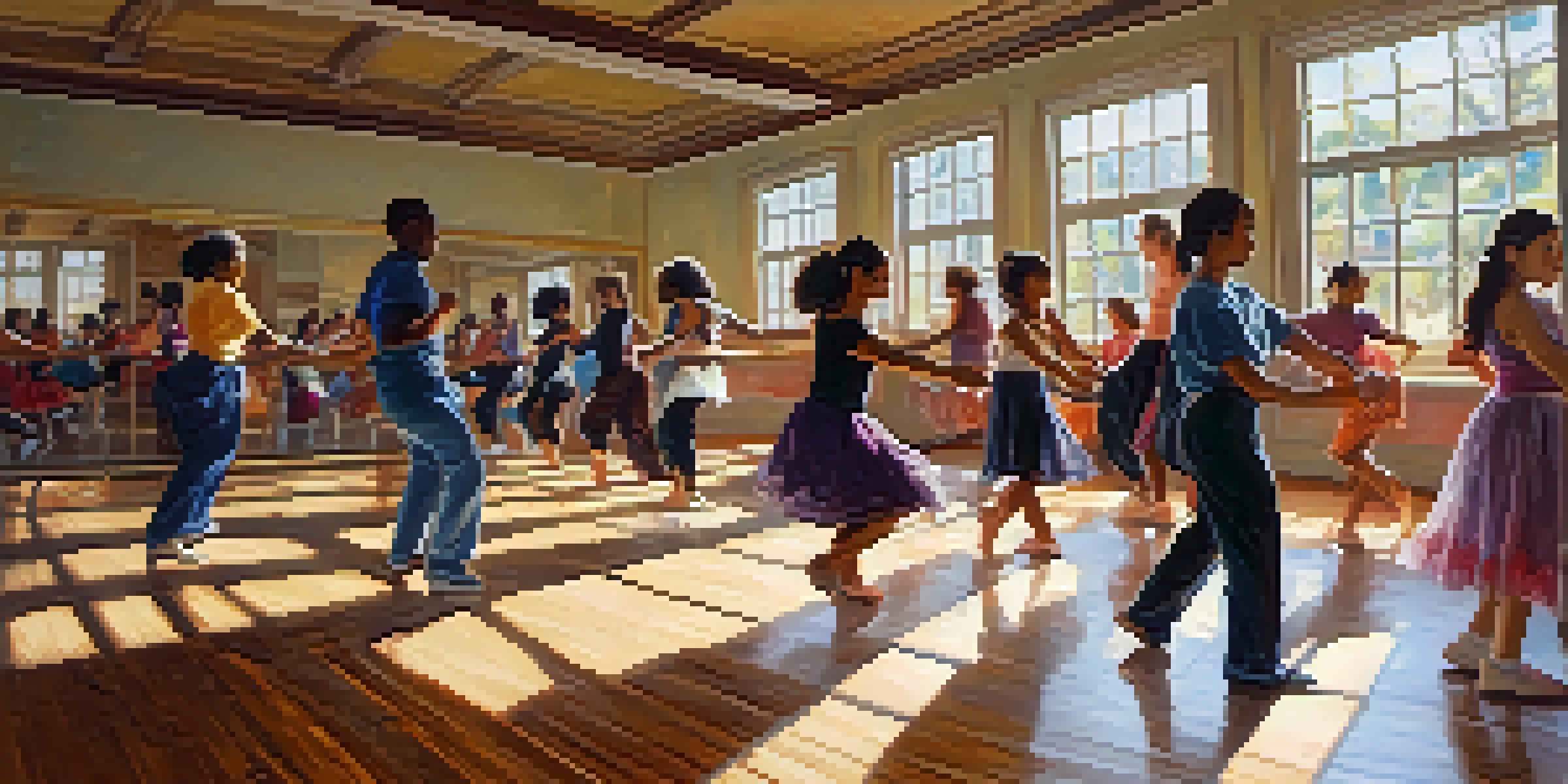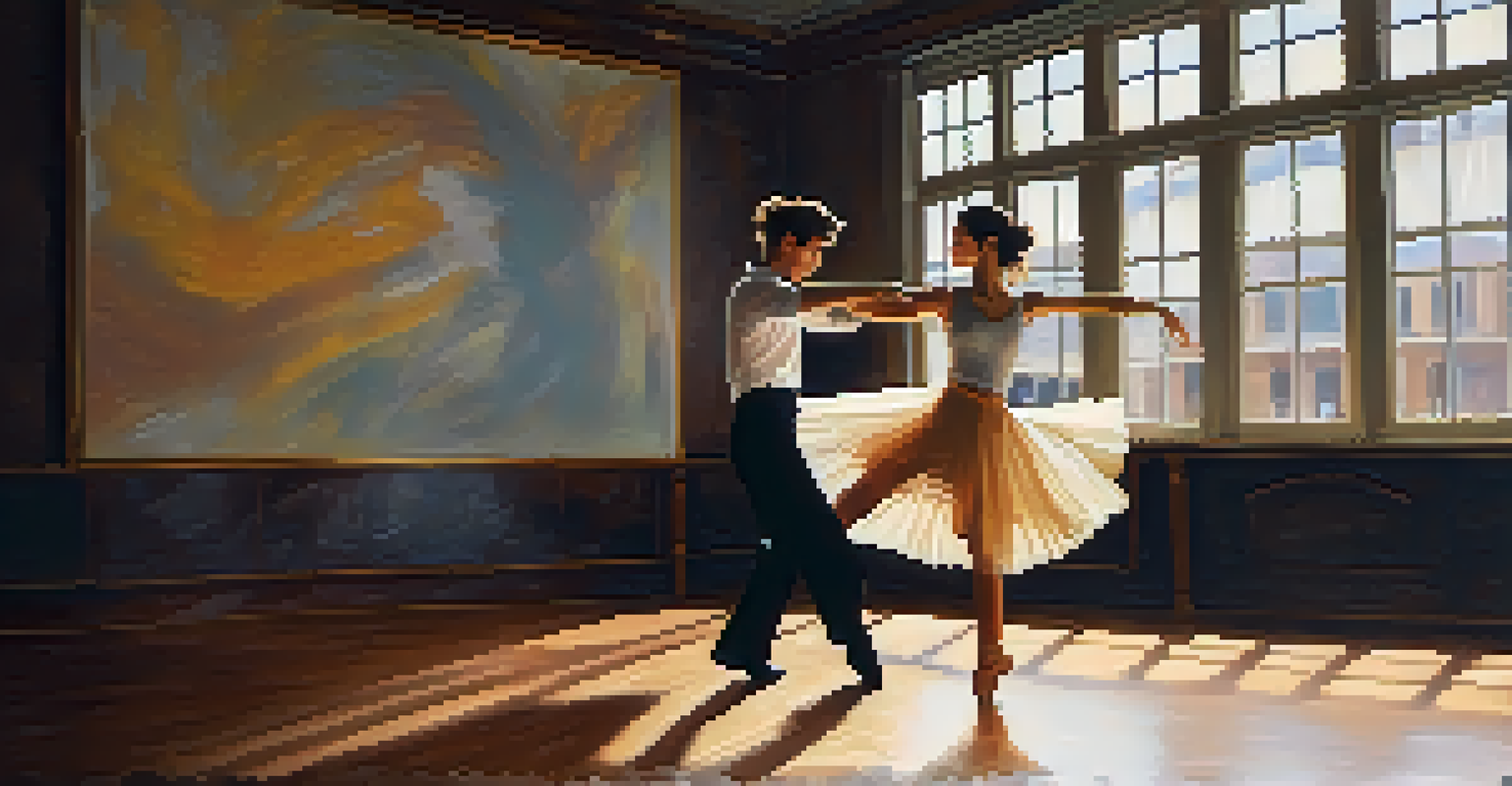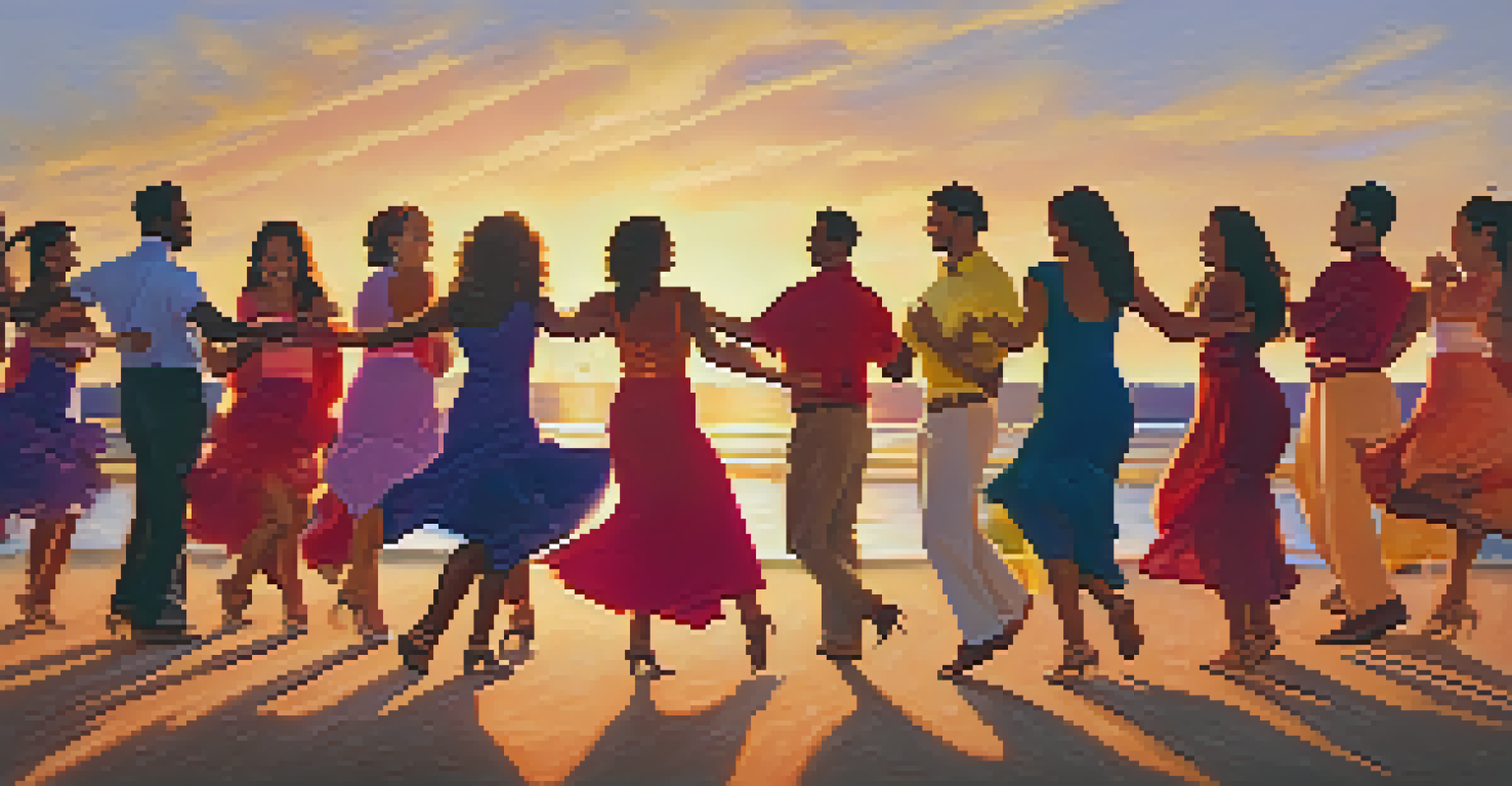The Connection Between Dance and Enhanced Interpersonal Skills

Understanding Interpersonal Skills and Their Importance
Interpersonal skills refer to the abilities that help us communicate and interact effectively with others. These skills are crucial in both personal and professional settings, influencing everything from team collaboration to building friendships. In essence, they encompass empathy, active listening, and conflict resolution, allowing us to connect deeply with those around us.
Dance is the hidden language of the soul.
The significance of strong interpersonal skills cannot be overstated. They enhance relationships, foster teamwork, and create a more harmonious environment. A person with well-developed interpersonal skills can navigate social situations more smoothly, leading to better outcomes in both work and life.
By nurturing these skills, we equip ourselves to handle diverse social scenarios, making it easier to establish trust and rapport. This is where dance comes into play, offering a unique medium through which these essential skills can be enhanced.
The Role of Dance in Promoting Social Interaction
Dance, at its core, is a form of expression that often involves collaboration with others. Whether it's a partner dance or a group routine, engaging in dance naturally encourages social interaction. This interaction fosters connections, as participants learn to communicate and synchronize their movements, both verbally and non-verbally.

Moreover, dance classes or social dance events create an environment where individuals can meet and bond over a shared interest. This communal aspect of dance helps break down barriers, making it easier for people to engage in conversations and form friendships. The joy of moving together creates a sense of belonging that many find rewarding.
Dance Boosts Interpersonal Skills
Engaging in dance fosters essential interpersonal skills like empathy, communication, and teamwork.
As dancers learn to work together, they practice vital interpersonal skills such as cooperation and adaptability. These experiences not only enrich their dance journey but also translate into better social skills in everyday life.
Building Empathy Through Dance Experiences
Empathy, the ability to understand and share the feelings of others, is a cornerstone of interpersonal skills. Dance can serve as a powerful tool for cultivating empathy, as it requires dancers to attune themselves to their partners' movements and emotions. This connection creates an awareness of how one's actions affect another person, leading to a more profound understanding of different perspectives.
To watch us dance is to hear our hearts speak.
For example, in partner dancing, one must not only lead but also follow, which demands a heightened sensitivity to the partner's cues. This dynamic fosters a sense of trust and respect, as both dancers become attuned to each other's needs. Such experiences can help individuals develop a more empathetic approach to various social interactions.
Ultimately, the empathy cultivated through dance can enhance communication skills, making it easier to engage in meaningful conversations and resolve conflicts amicably.
Enhancing Communication Skills with Dance
Effective communication is a vital interpersonal skill that encompasses both verbal and non-verbal forms. Dance, being a primarily non-verbal medium, allows individuals to express themselves and convey messages without relying on words. This can lead to greater confidence in expressing feelings and ideas in other settings.
During dance, individuals often use body language, facial expressions, and movements to communicate their intentions and emotions. This practice hones their ability to read and respond to non-verbal cues, a skill that is invaluable in everyday interactions. As dancers become more adept at interpreting these signals, they gain insights into their own communication styles.
Empathy Growth Through Dance
Dance promotes empathy by requiring participants to attune to their partners' movements and emotions.
Furthermore, the shared language of dance fosters collaboration and encourages participants to articulate their thoughts and feelings openly. This can lead to improved dialogue skills, making it easier to engage with others in various contexts.
Developing Teamwork Skills Through Group Dance
Teamwork is an essential aspect of interpersonal skills, and dance provides a unique platform to develop this ability. In group dance settings, individuals must learn to work together toward a common goal, whether it's perfecting a routine or performing in front of an audience. This collaboration fosters a sense of unity and shared purpose among participants.
As dancers practice, they learn the importance of supporting one another, providing feedback, and celebrating each other's successes. This experience can mirror workplace dynamics, where collaboration and mutual support are crucial for achieving objectives. By engaging in group dance, individuals can develop a stronger sense of camaraderie and communication skills that are transferable to team settings.
Ultimately, the teamwork cultivated through dance not only enhances the overall experience but also prepares individuals for successful collaboration in various aspects of their lives.
Boosting Confidence and Self-Esteem Through Dance
Confidence and self-esteem play critical roles in effective interpersonal interactions. Dance, especially when practiced in a supportive environment, can significantly boost an individual's self-confidence. As dancers master new moves and techniques, they develop a sense of accomplishment that can translate into other areas of their lives.
Moreover, the experience of performing in front of others, whether in a class or a public setting, can help individuals confront their fears and build resilience. This exposure to vulnerability fosters a sense of pride and self-assurance that enhances their ability to engage with others. A confident dancer is often more willing to initiate conversations and build connections.
Confidence Built on the Dance Floor
Practicing dance enhances self-esteem, enabling individuals to engage more confidently in social interactions.
By nurturing confidence through dance, individuals can approach social situations with greater ease, making it simpler to express themselves and connect with others authentically.
Dance as a Tool for Conflict Resolution
Conflict is an inevitable part of human interaction, but how we handle it can make all the difference. Dance can serve as a tool for conflict resolution by teaching individuals to navigate disagreements in a constructive manner. In dance, partners often need to find a balance between leading and following, which mirrors the negotiation skills required in resolving conflicts.
By practicing open communication and active listening on the dance floor, individuals can hone their ability to address misunderstandings and find common ground. This experience encourages a collaborative mindset, where both parties work together to create a harmonious outcome, rather than entering a power struggle.

Ultimately, the lessons learned in dance about compromise and cooperation can empower individuals to approach conflicts in their personal and professional lives with a more positive and solution-oriented perspective.
Conclusion: Embracing Dance for Interpersonal Growth
In summary, the connection between dance and enhanced interpersonal skills is profound and multifaceted. Through social interaction, empathy, communication, teamwork, confidence, and conflict resolution, dance offers a unique platform for personal growth. Each dance experience provides valuable lessons that can be applied to everyday interactions, enriching relationships and fostering understanding.
Whether you're a seasoned dancer or a curious beginner, engaging in dance can create opportunities for developing essential interpersonal skills. As you move to the rhythm, remember that you're not just learning steps, but also building connections that can last a lifetime.
Embracing dance as a tool for interpersonal development can lead to a more fulfilling social life and improved relationships, proving that sometimes the best lessons come from the dance floor.